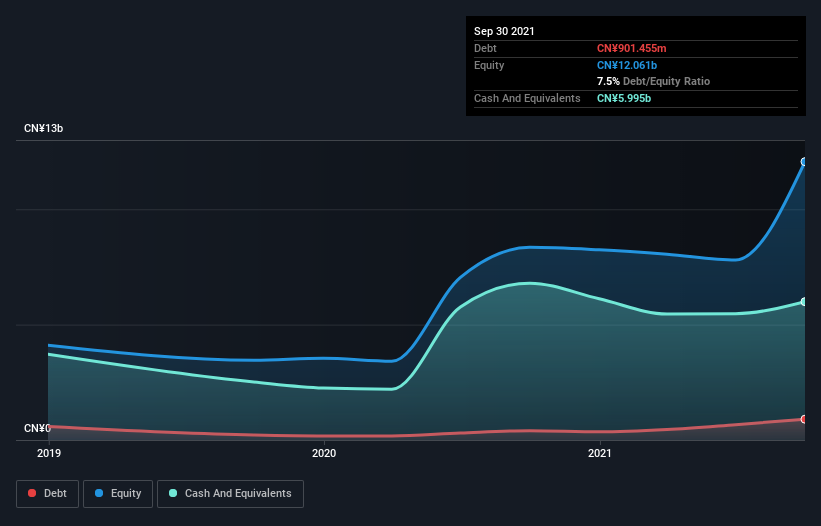Health Check: How Prudently Does Kingsoft Cloud Holdings (NASDAQ:KC) Use Debt?
David Iben put it well when he said, 'Volatility is not a risk we care about. What we care about is avoiding the permanent loss of capital.' So it might be obvious that you need to consider debt, when you think about how risky any given stock is, because too much debt can sink a company. We can see that Kingsoft Cloud Holdings Limited (NASDAQ:KC) does use debt in its business. But should shareholders be worried about its use of debt?
When Is Debt Dangerous?
Debt and other liabilities become risky for a business when it cannot easily fulfill those obligations, either with free cash flow or by raising capital at an attractive price. In the worst case scenario, a company can go bankrupt if it cannot pay its creditors. While that is not too common, we often do see indebted companies permanently diluting shareholders because lenders force them to raise capital at a distressed price. Of course, debt can be an important tool in businesses, particularly capital heavy businesses. When we think about a company's use of debt, we first look at cash and debt together.
Check out our latest analysis for Kingsoft Cloud Holdings
How Much Debt Does Kingsoft Cloud Holdings Carry?
As you can see below, at the end of September 2021, Kingsoft Cloud Holdings had CN¥901.5m of debt, up from CN¥402.8m a year ago. Click the image for more detail. However, its balance sheet shows it holds CN¥5.99b in cash, so it actually has CN¥5.09b net cash.
How Healthy Is Kingsoft Cloud Holdings' Balance Sheet?
Zooming in on the latest balance sheet data, we can see that Kingsoft Cloud Holdings had liabilities of CN¥5.93b due within 12 months and liabilities of CN¥2.11b due beyond that. Offsetting this, it had CN¥5.99b in cash and CN¥4.70b in receivables that were due within 12 months. So it can boast CN¥2.65b more liquid assets than total liabilities.
This luscious liquidity implies that Kingsoft Cloud Holdings' balance sheet is sturdy like a giant sequoia tree. With this in mind one could posit that its balance sheet means the company is able to handle some adversity. Simply put, the fact that Kingsoft Cloud Holdings has more cash than debt is arguably a good indication that it can manage its debt safely. There's no doubt that we learn most about debt from the balance sheet. But ultimately the future profitability of the business will decide if Kingsoft Cloud Holdings can strengthen its balance sheet over time. So if you want to see what the professionals think, you might find this free report on analyst profit forecasts to be interesting.
In the last year Kingsoft Cloud Holdings wasn't profitable at an EBIT level, but managed to grow its revenue by 43%, to CN¥8.3b. With any luck the company will be able to grow its way to profitability.
So How Risky Is Kingsoft Cloud Holdings?
Statistically speaking companies that lose money are riskier than those that make money. And in the last year Kingsoft Cloud Holdings had an earnings before interest and tax (EBIT) loss, truth be told. And over the same period it saw negative free cash outflow of CN¥1.9b and booked a CN¥1.2b accounting loss. However, it has net cash of CN¥5.09b, so it has a bit of time before it will need more capital. With very solid revenue growth in the last year, Kingsoft Cloud Holdings may be on a path to profitability. By investing before those profits, shareholders take on more risk in the hope of bigger rewards. There's no doubt that we learn most about debt from the balance sheet. However, not all investment risk resides within the balance sheet - far from it. To that end, you should be aware of the 3 warning signs we've spotted with Kingsoft Cloud Holdings .
If, after all that, you're more interested in a fast growing company with a rock-solid balance sheet, then check out our list of net cash growth stocks without delay.
Have feedback on this article? Concerned about the content? Get in touch with us directly. Alternatively, email editorial-team (at) simplywallst.com.
This article by Simply Wall St is general in nature. We provide commentary based on historical data and analyst forecasts only using an unbiased methodology and our articles are not intended to be financial advice. It does not constitute a recommendation to buy or sell any stock, and does not take account of your objectives, or your financial situation. We aim to bring you long-term focused analysis driven by fundamental data. Note that our analysis may not factor in the latest price-sensitive company announcements or qualitative material. Simply Wall St has no position in any stocks mentioned.

